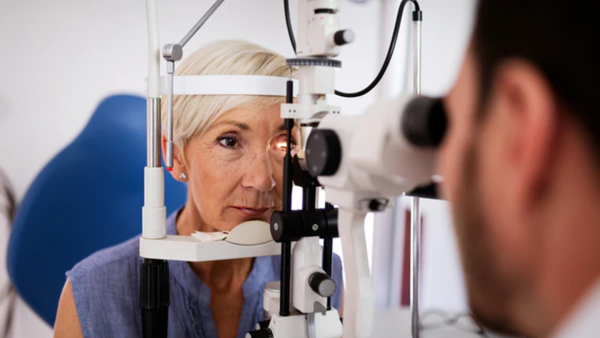In macular degeneration, waste products build up in the retina of the eye. Vision deteriorates and, in the worst case, macular degeneration can lead to blindness.
The causes of macular degeneration are not well understood. What is certain is that advancing age greatly increases the risk of macular degeneration. Light skin and blue or green eyes also seem to increase the risk of macular degeneration. Diet also plays a role in macular degeneration. Smoking, diabetes and high blood pressure also increase the risk of macular degeneration.
Micronutrients can counteract oxidative stress in the eye, which promotes the development and progression of macular degeneration.
IT'S WORTH READING!
AT THE END OF THE ARTICLE WE HAVE PROVIDED YOU A VOUCHER CODE.
Vitamin C
Vitamin C is an important antioxidant that can protect the eyes from oxidative stress. In macular degeneration, it is particularly effective in combination with vitamin E, carotenoids and zinc. [1]
Carotenoids
When UV light enters the eye, free radicals are created that cause oxidative stress. Oxidative stress appears to play an important role in the development of macular degeneration.
Carotenoids such as beta-carotene, lutein and zeaxanthin scavenge free radicals and thus protect the eyes from oxidative stress. Lutein and zeaxanthin can also scavenge UV light and thus offer further protection.
People who have a lot of lutein and zeaxanthin in their diet have a lower risk of macular degeneration. [2]

Zinc and copper
Zinc can also scavenge free radicals and thus reduce oxidative stress in the eye. It also has anti-inflammatory properties. In this way, zinc can probably counteract chronic inflammation in the eye that promotes macular degeneration.
People with macular degeneration are often not well supplied with zinc. [3] Conversely, taking zinc can slow the progression of macular degeneration. [4]
Coenzyme Q10
The body also has its own antioxidants that it can produce itself. These include coenzyme Q10 . Coenzyme Q10 is also important for energy metabolism and can help regenerate other antioxidants such as vitamin C and vitamin E.
However, the body’s own production of coenzyme Q10 decreases sharply with age.
In one study, coenzyme Q10 in combination with L-carnitine and omega-3 fatty acids was able to improve vision in macular degeneration. [5]
L-Carnitine
The body can also produce L-carnitine from methionine and lysine. It also has antioxidant properties and is important for energy production in the mitochondria, the power plants of the cell.

Omega-3 fatty acids
Omega-3 fatty acids are a component of cell membranes and are also found in the cells of the retina. Since the retinal cells renew themselves frequently, they require a particularly high amount of omega-3.
However, studies have provided conflicting results on whether omega-3 fatty acids can actually help with macular degeneration. [6] Since omega-3 fatty acids are essential and most people do not consume enough of them through their diet, it is always a good idea to ensure a good supply of omega-3 fatty acids.
Conclusion: Nutrients protect the eyes from oxidative stress
Oxidative stress caused by free radicals plays an important role in the development of macular degeneration. Since the eye is constantly exposed to UV light, it is at high risk for oxidative stress. Antioxidants such as beta-carotenoids, zinc, vitamin E, vitamin C, as well as the body's own antioxidants protect the eye from oxidative stress and can thus counteract macular degeneration.
WE HAVE PROVIDED YOU WITH A 10 % VOUCHER FOR OUR Vitamin C , Astaxanthin , Zinc & Copper , Coenzyme Q10 , L-Carnitine and Omega-3 AND HOPE TO MAKE YOU JOY WITH IT.
SIMPLY COPY THE COUPON CODE MAKULA+V10 AND ENTER IT AT CHECKOUT.
To the products
[1] https://www.ncbi.nlm.nih.gov/pmc/articles/PMC1462955/
[2] https://www.ncbi.nlm.nih.gov/pmc/articles/PMC4636082/
[3] https://pubmed.ncbi.nlm.nih.gov/18848316/
[4] https://pubmed.ncbi.nlm.nih.gov/25393287/

















